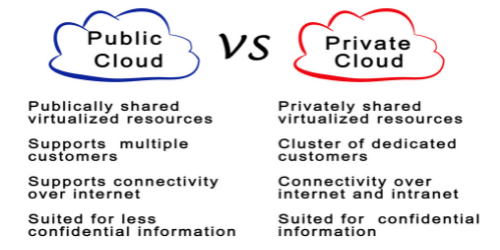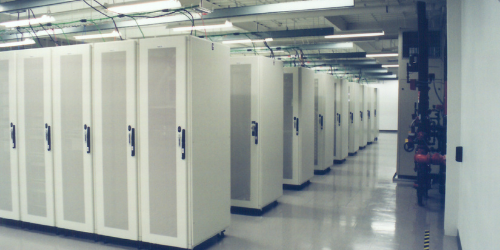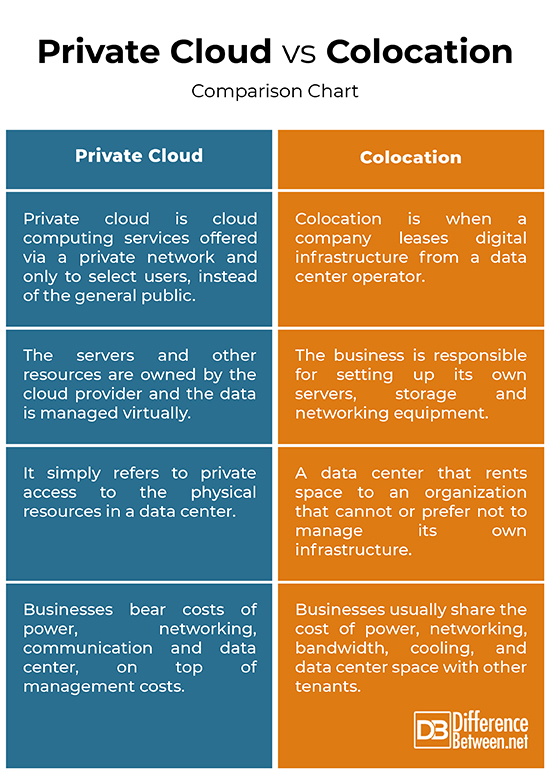Difference Between Private Cloud and Colocation
The widespread adoption of hybrid cloud within the enterprise space has led to the huge uplift in demand for data centers or colocation facilities. But choosing where to store data for your business can be a pretty daunting task.

What is Private Cloud?
Ever cloud model comes with its own benefits and complications. A private cloud, as the name suggests, refers to an on-demand pool of resources within a public cloud that are dedicated to a single business entity. It simply refers to private access to the physical resources in a data center. It’s where you put your cloud infrastructure and automation on top of resources that are in your data center. It delivers similar benefits to public cloud, including scalability and self-service, but in a privately accessed network. You are the sole owner of that data center facility, and the facility is exclusive to you.
Private cloud is basically cloud computing services offered via a private network and only to select users instead of the general public. It enables you to consolidate diverse enterprise systems into one that is cloud-based and can be accessed end users seamlessly, despite of their location and ever changing demands. You can control and customize it to fit your needs. This is why many organizations are migrating their data centers to private clouds to run core business activities that provide unique, competitive advantages.

What is Colocation?
Colocation (often referred to simply as “colo”) is taking your existing IT infrastructure, including servers, bandwidth, and networking equipment, and re-housing it within a secure data center. It is kind of a carrier hotel where you own your own hardware but augments its usefulness by renting server space in a data center. The date center provider provides you with redundant network connectivity, power and cooling. You rent space for your physical servers and other computing hardware at a third-party data center facility, as opposed making your own data center.
Colocation is when a company leases digital infrastructure from a data center operator. Colocation data centers’ customers are companies and institutions that, for many reasons, cannot or prefer not to manage their own infrastructure. The services offered there includes providing floor space or rack space for IT hardware, electricity supply, access control, fire protection, cooling, etc. as well as access to existing telecommunication networks – with a minimum of cost and complexity.
Difference between Private Cloud and Colocation
Concept
– Private cloud refers to private access to the physical resources in a data center. Private cloud is basically cloud computing services offered via a private network and only to select users instead of the general public. It delivers similar benefits to public cloud, including scalability and self-service, but in a privately accessed network. Colocation, on the other hand, is when you take your existing IT infrastructure, including servers, bandwidth, and networking equipment, and re-houses it within a secure data center.
Control
– A private cloud belongs to just one person and that person is the cloud service owner. You have full control over what you can do and how you can customize it to fit your needs. The resources are exclusive to you and are not shared with others. Colocation offers complete control over your data location and hardware setup. Not only business can select which provider they are going to use and by proxy, where it is physically located. But the hardware still belongs to them, so it can be designed to their specific needs.
Functionality
– Colocation mainly falls into the category of private cloud and the difference lies in how data is managed and stored. In a private cloud, the servers and other resources are owned by the cloud provider and the data is managed virtually. The users act as tenant administrators. A colocation facility is like a data center that rents space to an organization that cannot or prefer not to manage its own infrastructure. The servers are owned by the organization itself, which is responsible for setting up their own servers, storage and networking equipment.
Private Cloud vs. Colocation: Comparison Chart

Summary
In a private cloud, the servers and other resources are owned by the cloud provider and the data is managed virtually. The users act as tenant administrators. Virtualization is an important element of the private cloud. The features of the private cloud can benefit any business, regardless of its size. However, security is a big concern for businesses because of the self-service nature of the private cloud. A colocation facility is like a data center that rents space to an organization that cannot or prefer not to manage its own infrastructure. Businesses usually share the cost of power, networking, bandwidth, cooling, and data center space with other tenants.
What is the difference between colocation and cloud?
In cloud, servers are owned and managed by cloud service providers, and the data is managed virtually. Colocation is like high-tech real estate that provides you with redundant network connectivity, power and cooling.
Is Colo a private cloud?
Colocation, or colo, falls into the category of private cloud and refers to a data center facility that rents floor space to organizations that cannot or prefer not to manage their own IT infrastructure.
What is the difference between community cloud and private cloud?
Community cloud is a collaborative effort in which different organizations work on a shared platform. It is a hybrid form of private cloud that can be accessible by a group of organizations, as opposed to a single business entity in a private cloud.
- Difference Between Caucus and Primary - June 18, 2024
- Difference Between PPO and POS - May 30, 2024
- Difference Between RFID and NFC - May 28, 2024
Search DifferenceBetween.net :
Leave a Response
References :
[0]Wu, Caesar and Rajkumar Buyya. Cloud Data Centers and Cost Modeling: A Complete Guide To Planning, Designing and Building a Cloud Data Center. Massachusetts, United States: Morgan Kaufmann, 2015. Print
[1]Hilty, Lorenz M. and Bernard Aebischer. ICT Innovations for Sustainability. Berlin, Germany: Springer, 2014. Print
[2]Hurwitz, Judith S., et al. Cloud Computing For Dummies. New Jersey, United States: John Wiley & Sons, 2010. Print
[3]Image credit: https://www.canva.com/photos/MADF7DZP4g0-public-cloud-vs-private-cloud/
[4]Image credit: https://www.canva.com/photos/MAEEjoCbOz8-server-colocation-facility/
